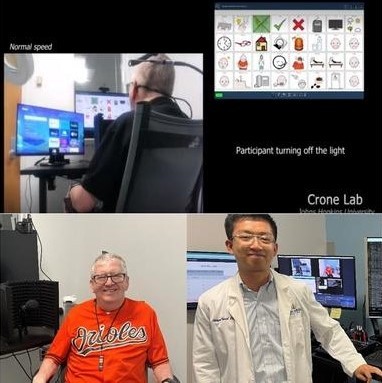The Brain-Computer Interface Giving an ALS Patient a Voice and Control
A brain-implanted device was used to reliably control a communication board and smart devices like lights and television for three months without recalibration
AI Image Generated with DALL-E 3
The day following the Baltimore Orioles' triumphant claim to the American League East Championship with their centennial season win, Tim Evans' bright orange jersey spoke volumes about his allegiance.

“It’s so great,” expressed Evans, his enthusiasm evident despite his 62 years and the Orioles' years-long gap since their last AL East win in 2014. The same year, Evans was handed a diagnosis of ALS—a relentless disease that erodes muscle function and speech.
Though his speech might be slow and often challenging for most to decode, there's a beacon of hope on his horizon: a brain-computer interface (BCI). It's like science fiction turning to reality—a device named Cortical Communication (CortiCom) that serves as a bridge between the brain and smart devices. With the collaborative efforts of Johns Hopkins Medicine and their University Applied Physics Laboratory, Evans became a part of a clinical trial that eyes the promise this device holds for those grappling with severe speech and movement impediments.
The fascinating part? By harnessing this BCI and a specially crafted computer algorithm, Evans has been granted the power to utilize a suite of commands, from "up" and "down" to controlling various smart devices. The results, published recently in Advanced Science, show a sustained accuracy of 90% over a three-month period without requiring the BCI algorithm to be retrained or recalibrated.
Nathan Crone, M.D., commented on the uniqueness of their study. “The BCI precisely captured a set of basic commands, empowering Tim to operate a communication board and manipulate household gadgets without leaning on a language model to rectify mistakes,” he elaborated.
Tim Evans can see the broader implications. "It's wonderful. Now, I can switch on my TV or dim the lights without budging an inch. I envision this being life-changing for many others like me."
A Glimpse into the Mechanics
The summer of 2022 saw William Anderson, M.D., Ph.D., M.A., and Chad Gordon, D.O., deploy electrocorticographic (ECoG) grids atop Evans' brain. This allowed them to capture the electric nuances of his brain cells.
For weeks on end, Evans collaborated with the researchers to finetune the BCI to his brain's unique rhythm. Shiyu Luo, the study’s lead author, said, “Even if his speech was a puzzle for most, the BCI worked like magic, interpreting his brain activity into clear computer commands."
The team's approach diverges from conventional BCIs by leveraging non-intrusive electrodes. Crone pointed out the benefits of this, noting that the broader, more stable neuronal responses they capture eliminate the need for daily recalibrations.
With this, there's a tantalizing future where someone severely paralyzed could start their day with a thought, lighting up their room and tuning into the morning news.
Crone didn't shy away from the study's limitations. “While our current vocabulary set is concise and intuitive, expanding it can speed up and diversify tasks,” he remarked.
As for the horizon, a bounty of studies are in the pipeline, expanding the BCI's vocabulary range and seeking new clinical trial participants.
Crone's optimism shines through. "We're witnessing a surge of investments in BCIs, bringing hope for many. However, we've got our work cut out to make this accessible to every potential beneficiary."
And for Tim Evans? There's a potential game-changer waiting in the wings. If the FDA nods in agreement, he might soon be tuning into the Orioles' games with just his thoughts.
Reflecting on the practical aspects of this advancement, Evans quipped, “My son’s notorious for misplacing the TV remote. Now, that won’t be a problem.”



















